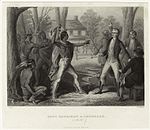Portal:Indiana/Selected article/3
Tecumseh's War or Tecumseh's Rebellion are terms sometimes used to describe a conflict in the Old Northwest between the United States and an American Indian confederacy led by the Shawnee chief Tecumseh. Although the war is often considered to have climaxed with William Henry Harrison's victory at the Battle of Tippecanoe in 1811, Tecumseh's War essentially continued into the War of 1812 and is frequently considered a part of that larger struggle.
The two principal adversaries in the war, Tecumseh and William Henry Harrison, had both been junior participants in the Battle of Fallen Timbers at the close of the Northwest Indian War in 1794. Tecumseh had declined to sign the Treaty of Greenville that had ended the war and ceded much of present-day Ohio to the United States. After the Greenville Treaty, most of the Ohio Shawnees settled at the Shawnee village of Wapakoneta on the Auglaize River, where they were led by Black Hoof, a senior chief who had signed the treaty. Little Turtle of the Miamis, who had also participated in the earlier war and signed the Greenville Treaty, lived in his village on the Eel River. Both Black Hoof and Little Turtle urged cultural adaptation and accommodation with the United States.
